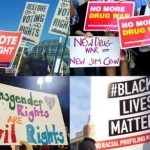WASHINGTON – The question of when the Supreme Court of the United States will take up a marriage equality case is now front and center, as cases from five states are currently pending before the justices and more than 70 cases challenging state marriage bans are working their way through the court system across the country. Today was the first day the Supreme Court might have announced it would take up a marriage case, but none of the appeals of federal circuit court rulings striking down state marriage bans have been granted certiorari, according to the Supreme Court’s order list. Some experts have interpreted recent comments from Justice Ruth Bader Ginsburg as an indication the Court is in “no rush” to take up the issue anytime soon. But every day that these discriminatory state marriage bans remain on the books, real families suffer the often tragic consequences.
“It’s easy to forget that all of these cases challenging state marriage bans across the country are about real people and real families,” said Human Rights Campaign (HRC) President Chad Griffin. “And while we usually think of love and celebration when talking about weddings, the truth is there are essential legal protections and safeguards that come with marriage. Until we have nationwide legal marriage equality, unwed same-sex couples and their families are at risk of devastating hardships that married couples don’t face if the unthinkable happens. It’s difficult enough for families to deal with crisis without the added layer of hardship from legal marriage inequality that gay and lesbian Americans face.”
Without legal marriage recognition, same-sex couples face issues in:
OUT-OF-STATE RECOGNITION: Same-sex couples can legally marry in 19 states and Washington, DC, as well as a number of countries around the world. But if two women that marry in one of those jurisdictions and then move to a state that bans marriage equality, they immediately become legal strangers in the eyes of their new state.
PROPERTY RIGHTS: Without legal marriage, there’s no guarantee of an automatic property transfer to a surviving spouse when someone dies. So a person may not be able to stay in the family home after a spouse passes away.
HEALTHCARE DECISIONS: Without legal relationship recognition, hospitals aren’t automatically required to inform or consult same-sex partners in times of emergency. In some cases, people have been denied the ability to say goodbye because they were unaware their partner or spouse was dying due to a lack of notification.
PARENTING: Banning marriage to same-sex couples frequently interferes with the non-biological parent being recognized as a parent. This harms children by denying them access to social security benefits, insurance coverage, emergency decision making, medical care and so much more.
ADOPTION AND CUSTODY: Many states only allow one parent in a same-sex relationship to be the legal parent to a child through adoption. Others don’t allow the same-sex spouse to legally adopt the children of their husband, wife or partner. So even though a person could have raised a child since birth, he or she could be denied custody of that child if the legal parent dies or the couple separates.
TAXES: Legally married same-sex couples living in a state that doesn’t recognize their marriage will generally have to file separate state income taxes – listing themselves as single – even though they file federal income taxes jointly.
EMPLOYER BENEFITS: Without legal marriage, employers aren’t required to allow their employees to list same-sex spouses or partners as beneficiaries of employment benefits, including health insurance.
SOCIAL SECURITY: Even legally married same-sex couples aren’t able to access Social Security benefits if they live in a state that doesn’t recognize their marriage.
VETERANS BENEFITS: The Veterans Administration is only recognizing married same-sex couples who currently live in marriage equality states. So the civil spouse of a military veteran of the same sex doesn’t have access to veterans benefits that every other spouse is eligible to receive.
EMERGENCY SERVICES: When disaster strikes families rely on each other. But without marriage, emergency shelters can separate families – even a parent from children if he or she has no legal claim to them.
Over the coming weeks, HRC will be collecting stories from real Americans that detail why the Supreme Court shouldn’t delay in taking up a marriage equality case. They can be submitted and found online at HRC.org/LoveCantWait. Here are three such stories detailing the devastating harm done to same-sex couples when denied legal marriage equality.
If she’d lived six days longer…
Lesly was an employee of the same company for twenty-five years and was 100% vested in the company’s employee pension plan. But even longer than Lesly’s service to her employer was her loving, committed relationship with Stacey – her partner of nearly thirty years. A few years ago, Lesly was diagnosed with cancer. When it became clear that Lesly was terminal and there was nothing more to be done, the family started preparing for her death. As part of this process, they began to review Lesly’s benefits from her employer. So it was a complete shock to the family when they were informed Stacey was not entitled to Lesly’s pension because they were not legally married in their home state of California. They knew the Supreme Court was set to rule at any moment in Hollingsworth v. Perry, a federal court case challenging California’s Proposition 8 banning same-sex couples from marrying. But unfortunately, Lesly’s condition took a turn for the worse and the family realized they didn’t have much time left. A gathering was quickly organized so that Stacey could stand next to Lesly’s deathbed and the two could have a wedding ceremony, surrounded by family and friends. Lesly died the next day. Less than a week later, the Supreme Court returned marriage to California and struck down key portions of the Federal Defense of Marriage Act. If Lesly had survived six more days, she and Stacey could have legally married and Stacey would have been eligible for Lesly’s pension. For this family, there was a rush.
A man’s final moments with his husband, stolen
Paul Hard and David Francher of Montgomery, Alabama had been together for seven years when they decided to get married in Massachusetts in May of 2011. Three months later, David was in a car accident less than twenty miles from their Montgomery home. Paul raced to the hospital to be by David’s side, frantically texting friends and family to pray for his husband. When he arrived to the hospital, he was told he couldn’t see David and was given no information about his husband’s condition. In the eyes of the State of Alabama, the two men were legal strangers so Paul had no right to any information. Less than an hour later, a hospital orderly told Paul, “Well, he’s dead.” The death certificate listed David as single. In the weeks and months following David’s death, Paul encountered a number of legal roadblocks in his quest for justice. Most notably, Paul was told he would be denied any proceeds from a wrongful death case because Alabama law forbids him from being listed the surviving spouse. Paul has enlisted the help of the Southern Poverty Law Center (SPLC), which has filed a federal lawsuit challenging Alabama’s discriminatory marriage ban on his behalf. But to add insult to injury, David’s mother has successfully petitioned the court to be added as a defendant in the case, fighting tooth and nail to deny her deceased son’s husband the dignity of being listed as what he his – David’s spouse. If the state of Alabama’s ban on marriage equality didn’t exist, a grieving widower’s heartache – and financial burdens – would not be exacerbated by legal hurdles targeting him for being gay.
Service members stationed in unfriendly territory
Active-duty military personnel are often moved from state to state throughout their careers when stationed at different military bases across the country. This can be emotionally burdensome for the spouses and families of service members. But for the spouses and families of gay and lesbian service members, there are legal problems that can be potentially devastating. While the military and the federal government recognize the legal marriages of same-sex couples, most states do not. Marine Cpl. Nivia Huskey and her wife Jessica Painter Huskey are expecting a child. Cpl. Huskey hopes to return from her deployment in Kuwait in time for the birth at the on-base hospital at Camp Lejeune where she is stationed. The only problem is, she will have no legal recognition as the child’s parent since North Carolina doesn’t see the two women as married. As the Navy Times puts it, “In an emergency, Cpl. Huskey won’t be able to make health care decisions on behalf of their child without presenting a medical power of attorney signed by Jessica Huskey. When it comes time to register for public school, the Marine once again won’t be recognized as a parent.” If the unthinkable happens and Jessica dies, there is no guarantee a state judge allow the children to remain with Cpl. Huskey — “especially if Jessica Huskey’s blood relatives fight for custody.” These women didn’t choose to live in a state that denies them marriage rights; they are required to live there by the military.















